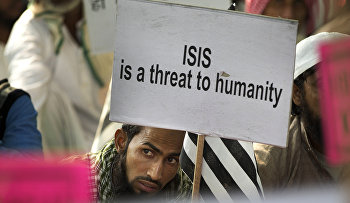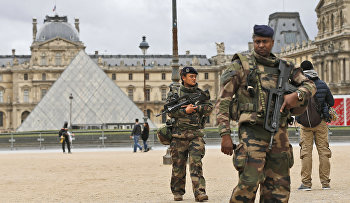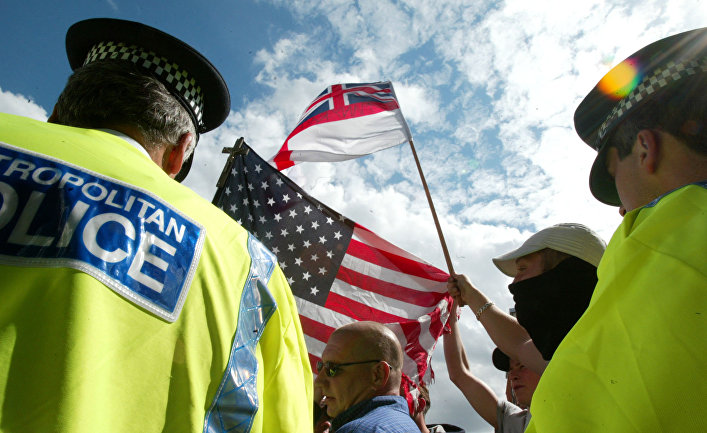Following the terror attacks in Paris, press suggestions appeared that these Islamist assaults on the French capital had been revenge attacks — prompted by a desire to avenge the death of one of the most notorious of modern terrorists — Mohammed Emwazi, a British citizen who gained notoriety under the nickname “Jihadi John.” On the 12 of November – just one day before the Paris attacks — American military sources announced his probable death in a drone attack. The suggestion that the Paris attacks were mounted in vengeance seems improbable, primarily because planning such operations is a lengthy process. Lenta.Ru has decided to present an overview of the life, and likely death of one of the most feared individuals of the new “Caliphate.”
The search for a terrorist
“While your rockets continue to fall upon our people, our knife will slash the throats of your people” declared Emwazi, in a message to American President Barack Obama. The message was in the form of a notorious video clip in which Emwazi then proceeded to behead one of his captives. The clips achieved viral viewing figures around the world, and became the calling card of the terror organization known as the Islamic State, or ISIL. The man in the black clothing, barking his certainties of retribution in British-accented English, became a symbol of the new global jihad – attracted recruits from all over the world, ready to launch attacks in any country.
The issue of identifying and rubbing out Jihadi John became a matter of pride for western intelligence agencies. Experts from the FBI, MI5, and Scotland Yard took part in the operation. According to the Daily Telegraph and National Post, experts used video analysis to determine the suspect's height, the vein pattern on his hands, his voice, and his clothing. Weapons specialists looked at his knife, to see where it might have been bought. The background locations of the videos were analyzed in the hope of identifying the locations of the executions.
Corbyn 'questions' legality of strike that killed Emwazi, in ITV News interview https://t.co/vMbjAg5xx5 pic.twitter.com/bVAtggVVVf
— ITV News (@itvnews) November 16, 2015
At first press rumors suggested that the individual behind Jihadi John's mask was Abdel-Majed Abdel Bary – the son of a notorious jihadist named Adel Abdel-Bary. This young man had also lived in London, and fled to Syria to fight in the ranks of ISIL. To fans of social networks, he was also known as a rapper named “L Jinny.”
Finally on 26 February The Washington Post revealed the true name of the executioner.
The path to jihad
Mohammed Emwazi was born on 17 August 1988 in the Kuwaiti town of Al-Jahra. According to The Guardian, the future terrorist and his family moved to Britain 1993, where they waited three years for their refugee status to be confirmed. As the Daily Mail reports, his parents chose to live on welfare, although his father was working as a taxi driver. In total, the British state paid around £400,000 pounds for the family's upkeep and welfare.
Mohammed Emwazi: the 'tall, quiet kid' who became a monster https://t.co/ALSncHubOg
— The Guardian (@guardian) November 14, 2015
In 1995 Mohammed went to primary school, not far from his home – neighbors said he was a timid and quiet boy. At home the family spoke Arabic, and regularly attended the mosque – but in other respects, they led an entirely British lifestyle. Mohammed was the only Muslim in his class at school. School records preserve a questionnaire he completed when he was ten. The future Jihadi John wrote that his favorite color was blue, his favorite animals were chimps, his favorite cartoon was The Simpsons, and his favorite food was potato crisps. In answer to the question about his future in twenty years, he wrote that he hoped to be a footballer, and play in goal.
“He played football every lunch-break. He learned new English words and phrases from computer games. Like all boys, he wanted to play as a forward. He wasn't much good at academic subjects, but he loved sports. He was popular with the other kids,” recalls one of his primary-school classmates. Another school friend of the future jihadist remembered one moment playing football, when he hurt his head badly on the goalpost. “We didn't see him at school for six weeks. But after banging his head on the goalpost, he seemed to have undergone a transformation – he wasn't the same as before.”

At secondary school Mohammed worked hard at his schoolwork, but Islam was beginning to exert a stronger influence on his daily life. He began wearing traditional dress, and his sister wore a hijab. His behavior underwent a radical change when he became a student, at the University of Westminster. He began attending various mosques, where he came under the influence of Bilal al-Birjawi, a member of Al-Qaeda. Despite this, one of his college friends recalls that Mohammed would attend parties with alcohol, smoke marijuana, and often got into fights with other students.
Emwazi was seen going on marches alongside radical Islamists in London. People believe it was Bilal al-Birjawi who took the leading role in radicalizing Emwazi as a young man. The British authorities allowed him leave the country five times over the period of 2006-2009, without really realizing what his intentions were. Al-Birjawi was killed in a drone attack in 2012. One former student at the University of Westminster gave an interview to the Daily Mail, in which he said that all the circumstances there were right for the radicalization of the young Emwazi. “There was one time when I met the members of the Muslim community at the University – they clapped and cheered in approval of the events of September 11th.” The interviewee went on to say that Islamic radicals were trying to win the other students over to their ideas.
British associate of Jihadi John held in Turkey over plot to carry out copycat Paris attacks https://t.co/MWHbMTX4r5 pic.twitter.com/XlAfDDzQuY
— The Telegraph (@Telegraph) November 15, 2015
Having completed his studies and graduated as a computer programmer, Amwazi left for Tanzania, where he and his friends tried to travel onwards to Somalia, claiming to be on a safari. He was not granted entry to Somalia, and was instead put on a plane for the Netherlands. In letters he sent to CAGE – an organization which protects the rights of those unjustly accused of terrorism – Emwazi said he had been interrogated by British intelligence, who accused him of attempting to join the terrorist group Al-Shabab.
Emwazi claimed that when he returned to London, he discovered that his family had received police visits, as had his fiancée. The girl was so frightened that she called their wedding off. This all made Mohammed decide to move to Kuwait, where he would no longer be harassed by the authorities. A year later, he made a family trip to London. The future jihadist claimed that at Heathrow an intelligence officer questioned him about the purpose of his visit, “grabbing him by the beard,” and “throwing him against a wall.” He was not allowed to return to Kuwait. “I felt I was being imprisoned,” he wrote to CAGE. His friends say that it was during this period he began talking about Syria, and his hopes of joining the opponents of President Assad.
His parents advised him to change his name, and he then tried to leave for Kuwait once more – but was again denied permission to travel. Several days later he had disappeared from his family's home, and then popped up subsequently in Syria. Two British medics, who happened to talk to Emwazi while in Syria, told The Daily Mail, on conditions of anonymity, that he was then planning to join the terror group Al-Nusra Jabbat, adding that he had “nothing to lose.”
The Rakka Four
However, it turned out that Emwazi instead enlisted in ISIL, where he quickly rose through the ranks. Along with three other Brits he became a jailer for the self-proclaimed Caliphate in Rakka. It was here at the prison that he acquired his nickname from the inmates – who called the quartet of jailers “The Beatles” because of their British accents. George, Paul, Ringo… and Emwazi became Jihadi John.

“The Beatles” guarded the most valuable prisoners – citizens of foreign countries. The jailers were notorious for their cruelty – they used electric shocks, water torture, and mock executions. One of the former prisoners later gave an interview to CNN, where he outlined the sophisticated torture methods of Jihadi John. “He pulled me up, and then forced me to dance a tango for them. I had my head down, I was scared I would be beaten. He led me round the prison, but then somehow changed his mind, and threw me to the floor. They beat me, and said they would chop off my nose with shears.”
Once Emwazi's identity was revealed in the media, he stopped appearing in new videos. His status as Jihadi John was gone – he no longer represented the global all-powerful Jihad. Now he had a name, and a personal background. His death will not diminish the military abilities of the Islamic State. However, one of the main weapons of the self-proclaimed Caliphate – its huge propaganda campaign – has taken a severe knock-back.






